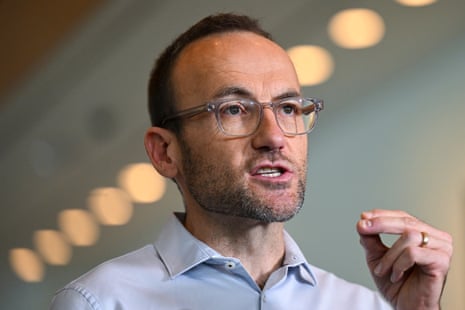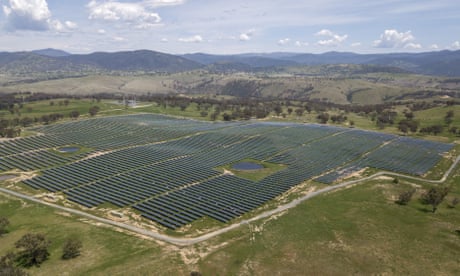Extract from The Guardian

Adam Bandt says deal puts ‘significant hurdles’ in the way of new coal and gas but Chris Bowen insists it will not kill off new investment.
Mon 27 Mar 2023 14.39 AEDT
Last modified on Mon 27 Mar 2023 15.15 AEDTThe Greens leader, Adam Bandt, announced the deal on the safeguard mechanism bill on Monday, taking credit for “a big hit on coal and gas” that could effectively block half of 116 proposed new fossil fuel projects.
Bandt told reporters in Canberra the deal puts “significant hurdles” in the way of new projects including development of the vast Beetaloo gas basin in the Northern Territory, with up to $1bn a year in costs to offset its emissions enough to “derail” the business case for the project.
The government believes the safeguard mechanism deal puts it on track to achieve its emissions reduction target of 43% by 2030. It will be opposed by the Coalition, which has attempted to link steps to curb emissions from new coal and gas projects to price rises despite most of the developments being for export.
The climate change and energy minister, Chris Bowen, played down the Greens’ claims by noting the deal was still in “keeping with our election mandate” not to ban new fossil fuel projects while also achieving its aim of reducing absolute emissions.
The safeguard bill, which requires big industrial emitters to reduce emissions intensity by 4.9% a year to achieve 205m tonnes of greenhouse gas reduction by 2030, is set to pass the House of Representatives on Monday, The bill will go to the Senate this week, where the Jacqui Lambie Network and David Pocock are likely to give Labor the votes to pass it.
The centrepiece of the Labor-Greens deal is a hard cap of 1,233m tonnes of carbon dioxide by 2030, which will impose a declining annual limit on absolute emissions starting at 140m tonnes.
The Climate Change Authority will report on whether new or expanded projects could result in the overall carbon budget being exceeded, triggering obligations on the minister to tighten rules to keep emissions under the cap. This could see the government forced to choose between imposing greater emissions reductions on existing industries or blocking new projects.
Bandt told reporters it was “very unlikely” the minister would opt “for a new coalmine … rather than a new lithium mine”.
New entrants will need to meet international best practice to ensure emissions decline over time, a move that should limit existing industries such as manufacturing being disadvantaged.
Gas developments in the Beetaloo basin will have to be net zero for their direct scope one emissions, which means they will have to offset all pollution released, a step that makes it more expensive to get a project up. All new gas fields for liquefied natural gas export projects will also need to be net zero for CO2 emissions.
Carbon offsets will be subject to the recommendations of an integrity review that reported back in January. They included a freeze on issuing credits from contentious “human induced regeneration” projects until they have been assessed to ensure they comply with the methodology set out.
A proposed “powering the regions” fund will receive an additional $400m in funding to help cut emissions, on top of an early $600m. The money will be available for manufacturing sectors only – steel, cement, lime, aluminium and alumina – and not fossil fuel extraction.
No limits will be set on companies’ use of carbon offsets to meet their emissions reductions, but if a company uses offsets to meet 30% or more of their requirements, they will be required to explain to the regulator why they have done so.
By 2027, the Climate Change Authority will look at the use of offsets and implementing measures to restrict their use if onsite abatement is not occurring to satisfactory levels.
Despite the deal, new coal and gas projects are likely to remain a significant flashpoint between Labor and the Greens.
Bandt said Labor had acted like the “political wing” of the coal and gas lobby in negotiations, and appeared determined to leave room for some new fossil fuel projects.
“We’ve secured a pollution trigger that, for the first time in history, means new projects must be assessed for their impact on climate pollution and they can be stopped,” he said.
“Labor now has the power to stop coal and gas projects that would breach the pollution cap. Every new coal and gas project that gets approved from here on in is Labor’s direct responsibility.”
Bowen and the prime minister, Anthony Albanese, rejected claims the deal could kill off new investment in gas projects and force up power prices.
Albanese said: “The demands that were placed on us, ruling out future projects, are ones that we said we wouldn’t agree with – and we haven’t.”
Bowen said the cap meant “a reduction in aggregate emissions across all facilities, old and new”.
Bowen thanked those who had helped to “ensure accountability, transparency and integrity for the scheme, and ensure flexibility and support for industry”.
“Business and climate groups have been clear that the parliament should pass the strengthened legislation in front of it and deliver overdue policy certainty – but Peter Dutton would prefer to drag Australia backwards and continue the climate wars.”

No comments:
Post a Comment